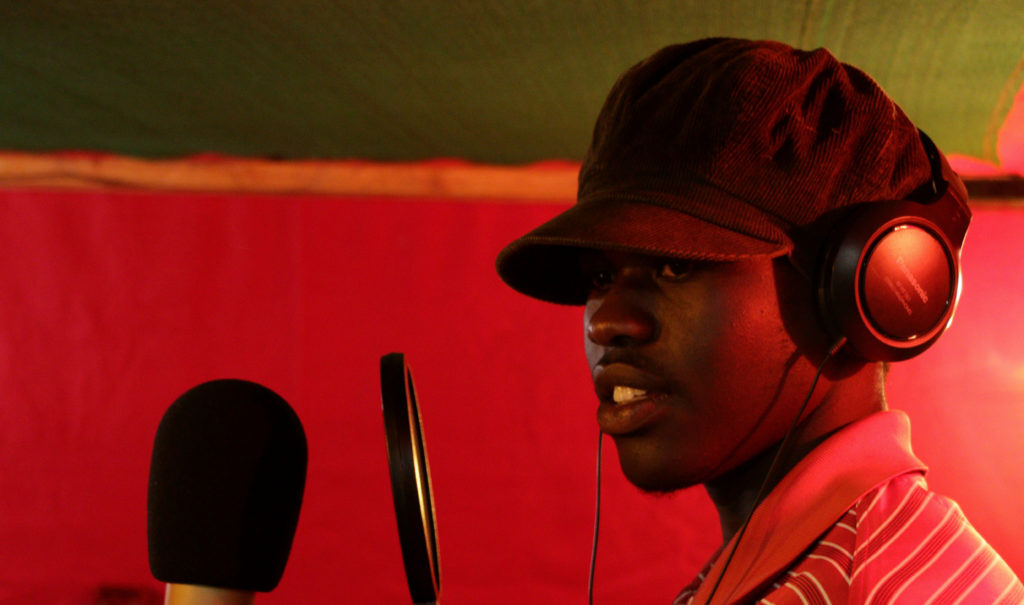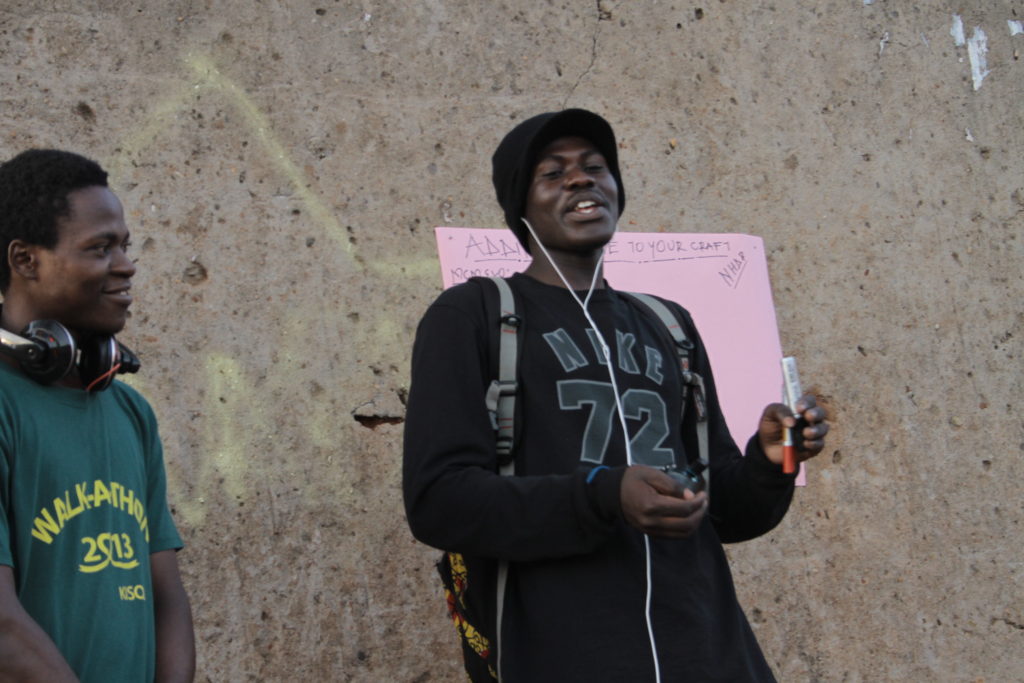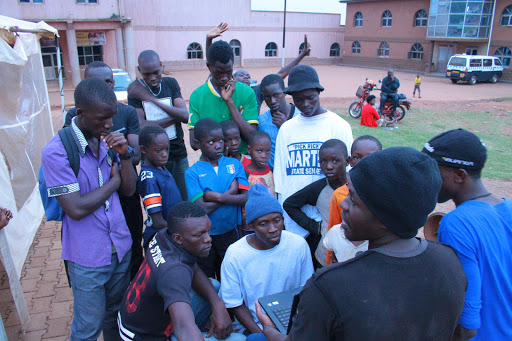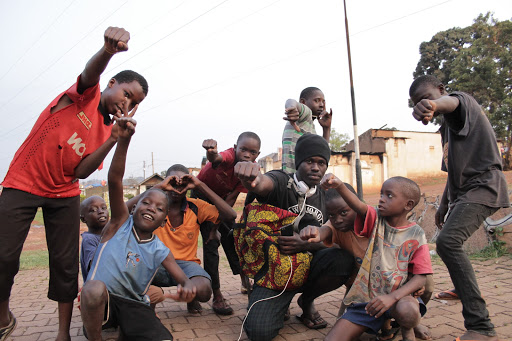Godwin Mindrea Buwa and Mulombamungu Aloys II, Musicians
Sylvia Namulema Kigula, Performing Artist
Tereka Kenneth Desire, Performing Artist
D Mc Viniikizo
Musician, Dancer, Community Youth Activist, and Social Entrepreneur
D Mc Viniikizo was born in 1992 and given the name Sentamu Nuludiini. Only four years old when his parents were killed because of their political beliefs, his brother, two sisters and he went to live with their aunt for six years in a slum in Kampala. Surrounded by his drug-dealing friends, he only saw their pain as they barely survived poverty. Some of them died from overdoses. D MC knew better for himself. He was never tempted to use drugs to escape the harsh reality in which he lived. Despite the difficult conditions of his early life, D Mc grew up strong and loving, making a difference for the youth in his community through his writing, performing, and teaching. He sings hip-hop and raps, he break dances and beat boxes, and creates graffiti and poetry.

Living in the slums and using drugs are common for Ugandans. D Mc explained that few jobs are available and the government makes no effort to provide their people with ways to make a good living—or they don’t pay the people for the hard work they provide. The government deliberately keeps the people poor.
To give you a idea of the life for the poor people in Uganda, read these statistics: According to The World Bank’s Rural Poverty Portal, while Uganda has made progress in reducing poverty from 56 percent in 1992 to 24.5 percent in 17 years, about 27 percent of all rural people (that is eight million men, women, and children of the country’s population of 38.8 million people) live below the national rural poverty line. Hundreds of thousands of small-holder farmers living in remote areas fair the worst. Living and making a living in the rural areas is a hardship. People do not have cars or access to roads to trade their produce. They do not have technology and tools for healthy and productive farming nor financial services to assist them in improving their incomes. Their lives are fragile. They have little food and are vulnerable to extreme climate change and health and social issues—especially HIV/AIDS. HIV/AIDS is a prominent cause of death among young adults. More than 1.2 million children are orphaned from losing their parents.
While life in the rural areas is dire, the underserved in the city also suffer. The government makes it hard for people to make money and express themselves freely. For instance, D Mc makes hand-made bags that he sells on the street. But then the government sends police to the streets to confiscate his bags as well as other vendors’ goods. And if it’s not the police actions, it is difficult to sell his bags on the streets because people do not have the money to purchase them. Adding insult to injury, if he or others try to sell their goods or promote themselves as artists on FaceBook or Twitter, social media is blocked. As a musician, D Mc says the government makes it very difficult to write and sing songs about problems or politics. Dancers must be careful about how they dance. The government blocks these songs and dances from airing over the Internet. D Mc says this oppression is preventing him from experiencing the creative process. It is challenging for D Mc or any artists to be known outside of Uganda. They do not have money to travel. The world for Ugandans is small because the government is silencing its people’s voices and preventing them from participating in our global community.
Making a living and freedom of speech are two serious issues for Ugandans, another is violence and feeling protected by the police. Last May (2016) when the new president was sworn into office, violence erupted in the streets. People fled from the police in the city for safety in villages. D Mc says the police do not always protect the safety of the people.

D Mc is determined to make a positive difference through his music and art. He participates in “rap battles” to support children. His rap performances are positive and he believes he is setting a good example for children.
Since D Mc started performing, he had an idea to create a project that would use elements of hip-hop and art to help his community. The idea came to him back in the days when he lived in the slum as a child. At the time, he was not able to stop his friends from taking drugs until one day, they saw him break dancing. They were really excited about his dancing, so D Mc started teaching them the elements of hip hop. He knew that if they took to learning, they would not have time to use drugs. As they learned and participated in hip-hop, he saw their attitude changing. They became positive. That’s when D Mc thought about starting an organization where he and his followers could teach dance, and beat boxing for positive change.
One night while sleeping, he had a dream where he was saying words from a song, “I know I can, we wanna, wanna.” And from those words, he came up with the name of his organization, U U Can Mcing Project Uganda, which means in Lugandan (his language) Nawe Osobolo. D Mc dream came true.

Today D Mc runs the Naw Osobola Mcing Project (NOMPU). NOMPU, as D Mc describes it, “is a young-centered project that works directly with young people of different backgrounds in Uganda to increase awareness in the world and raise money to send back to Uganda to help his people. The project is centered on the belief that everyone can learn and everyone can teach and has the capacity to be a positive role model to others. NOMPU is built around free hip hop, breakdancing, icing, beat boxing, graffiti art classes etc currently offered at Bwaise slum community Kampala. All of the activities D Mc leads at NOMPU bridge the gap between the advantaged and disadvantaged and bringing people of different religions, tribes, and social backgrounds together. It promotes positive social responsibility; increases access to formal and informal education; generates employment opportunities through private teaching and performances; and connects local and international artists.” In all of D Mc’s teachings, he incorporates reconciliation and peace building.

D Mc expresses his concerns in every endeavor he creates whether it is personal or for NOMPU. He wrote a song called “Embeela Etunyiga,” which means “Life”. It speaks for the youth who graduate from school but cannot get a job, so they have to sell kikomado, a street food made of fried bread and beans sold in Kamapala, and drugs to survive, even though they have a degree from school. And he sings about how the president is oppressing his people, sickness such as HIV and malaria, not having access to clean water or food, and racism. His rap and poetry are about people that he saw living in difficult times with family, or they are sick, or using drugs. He tries to express encouragement for those who are suffering desperation and inspire them through his story of endurance. His efforts to teach break dancing and beat boxing help those interested in focusing on the positive energies of life and helping other people. Twice a week he leads hip-hop and art graffiti and knowledge workshops. All of the efforts of his organization are making an impact in the slum communities, where people are turning to art instead of drugs and gangster activities. Two people that he taught turned their lives around from negative to positive and are now teachers at Naw Osobola Mcing Project.
He knows he is making a difference in the lives of children and others. For example, he tells the story of Emirri Mc who used to pass time in the ghetto. One day Emirri Mc saw D Mc performing and liked what he aw. Emirri Mc went up to D Mc, saying he wanted to be like him. DM invited Emirri Mc to the project for free classes to show him how to rap. Since the first class, Emirri Mc has been attending the project for three years. He is spending less time in the ghetto. D Mc says, “We try to support him so he becomes a nice MC.” Emirri Mc has become one of the best battle MCs in Uganda!
D Mc connects with the issues of the Kulturbund in that the authorities (both Nazis and Ugandan government) controlled what art could be expressed and how it could be expressed. And despite Ugandan’s government control on artistic expression, technology allows D Mc to share his artwork. He believes that through the The Jüdische Kulturbund Project, people can know that Uganda is very artistic but that they must work harder for others to know their art.
At age 24, D Mc still lives with his aunt but no longer in the slums. He would like to travel out of the country to places like Canada, Jamaica, and the United Kingdom to reach people about peace, love, and unity. He wants to raise awareness about the problems for people in Uganda.
Unfortunately, because of the expense of and accessibility to Skype, we were unable to conduct a video Skype interview with D Mc. Below are excerpts from our written interview.
Excerpt #1
I have made bags for people who ask me for them only. I went to rap battles to support my young ones at these rap battles. I have been asked to perform sometimes because I rap in a positive way and I am setting an example for the young ones. I decided to create a project that would use the elements of hip hop and art to help my community in a positive way. I try to be a positive influence and inspiration to my community. I looked at my friends and community people using drugs and I wanted to tell them to stop it. They did not want to stop using. One day, they saw my break dancing and they liked it. So I knew when I started teaching them hip hop elements they would not have the time to go sit somewhere and think of using drugs. I started teaching them and they became positive. Then, I started to think of how I could open a hip hop youth organization, where I, along with those I inspired, could teach dance, rap, and beat boxing for positive change. When I was sleeping one night, I had a dream where I was saying I know I can, we wanna, wanna. Those are words from a song. I don’t remember the artist who sang it, but that’s when I decided to name the organization u u can Mc-ing project Uganda. In my language, it means Nawe Osobola, and that is why the project is named the Nawe Osobola Mcing Project. That’s how the dream came to be real life.
Excerpt #2
I also rap and write rhymes. I write about the stories I’ve seen of people with their difficult times with family, or if they are sick, using drugs, the time I spent in the slums and what I saw there. I try to make my rap be about positivity so that I can inspire others through my story. I also use my breakdancing as a way to focus on positive things because many people in Uganda are interested in breakdancing and even beat boxing. I can use these elements to help them focus on positive things and help other people. My project uses these elements of hip hop, as well as an art graffiti workshop and knowledge workshop to help other people in my community two times a week. I’ve seen change in people who have come to my project. They youth we teach in the slums community so that they stay away from drugs and the gangster life. Two people that I taught turned their life from negative to positive and became teachers in my project.
Excerpt #3
I want people to know that even though we are not living in the 1930’s anymore with the Nazis controlling art expression, here in Uganda, we are still dealing with many of the same problems with freedom of expression even today. Ugandan artist are not able to express themselves or publicize their work as freely as other artists in the world. We have barriers that other artists do not have. I think this project can help people know that Uganda is very artistic but that we must work harder than others to have our art known. I think it can teach people that in other parts of the world there are political reasons that do not allow artists to fully use their artistic expression, and that is not fair. There is much good art in Uganda to be experienced but much of the world cannot see it.
Excerpt #4
For my music, technology lets me get a sound track that I can record my raps onto and then I can share that. Technology lets me promote my project to many parts of the world. People all over the world see pictures, videos on YouTube, and information about my project. Technology also allows me to teach. I have been teaching a class in Canada how to breakdance and beatbox through videos that I have recorded on YouTube. Technology lets me share what I do and educate people about the difficulties we face in Uganda.
Godwin Mindrea Buwa and Mulombamungu Aloys II, Musicians
